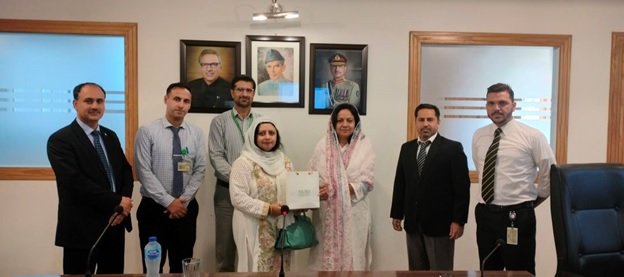Learning Outcomes:

ORIC in collaboration with Small & Medium Enterprises Development Authority (SMEDA), has organized an interactive session for NUMS students and faculty/researcher titled “Entrepreneurship as a Viable Career Option’’. Dr Ayesha Abrar, PhD Entrepreneurship, Assist Professor, NUST appropriately nominated by SMEDA as a resource person conducted the training session at NUMS PWD Campus.
Learning Outcomes:

ORIC organized an orientation session for NUMS Faculty as per the directive of the VC NUMS. A presentation was given by Mr Ali Iqbal, Manager Solicitation and Evaluation, IGNITE National Technology Fund on 21 April 2021 to discuss the possible funding options through IGNITE. In this regard, concept notes on a number of research themes were received from NUMS Faculty for possible IGNITE funding.

ORIC arranged a talk by Prof Tahir Mehmood Chaudhry, Director Ovex technologies (Pvt) Ltd, Islamabad, on “Entrepreneurship in Medical Science” for the NUMS Faculty and Researchers for an orientation on the concept of start-up incubator approach among our researchers further to tap and understand the market needs pertinent to healthcare by bridging the necessary gap in available health services.

"Explainable AI - Role in Teaching, Research, and Clinical Management" examines the significance of explainable artificial intelligence (AI) in transforming academia and healthcare. By providing transparent and interpretable insights, explainable AI empowers educators, researchers, and healthcare professionals to make informed decisions based on understandable AI-driven outputs. For the said purpose NUMS Office of Research Innovation and Commercialization(ORIC) organized a capacity building session on the topic of "Explainable AI - Role in Teaching, Research, and Clinical Management." at the National University of Medical Sciences, PWD Campus, Islamabad, on Tuesday, 20 June 2023. Dr. Rehan Ahmed (Dean Riphah Institute of Assessment, HOD and Professor of Surgery, Chairperson Assessment Committee Riphah International University) was the keynote speaker. The session focused on AI's role in teaching, research, and clinical management along with ethical concerns.
The workshop was actively attended by Head of Departments, faculty members and students from Biological Sciences, Public Health, Psychology, Nutrition & Dietetics, Social & Behavioral Sciences and Clinical Research. Assistant Director ORIC opened the session with the welcome note & introduction of the respected guest speaker to the audience. The session provided faculty members with valuable insights into the transformative potential of Artificial Intelligence (AI) in academia and healthcare. The session highlighted the benefits of AI in personalized learning, research acceleration, and clinical decision-making, while also emphasizing the need to address ethical concerns. Attendees expressed their appreciation for the comprehensive understanding gained from the session, noting increased awareness, knowledge exchange, and a commitment to incorporating responsible AI practices in their work. Overall, the session successfully disseminated knowledge and fostered enthusiasm for AI-driven approaches in teaching, research, and clinical management. The session will serve as catalyst to encourage faculty and students to adopt latest technological trends related to AI to enhance their day to day working.
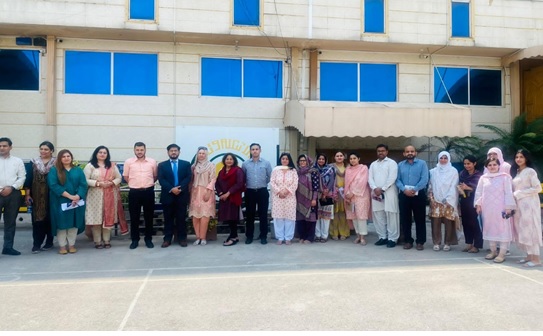
Emotional Intelligence holds a pivotal role in daily life, the workplace and particularly in transitionary phase b/w childhood and adulthood. The said concept has critical role in dealing with psychological issues, effective parenting, the role of management in organizational success, methods of encouragement, and its implications in structural life. In this framework, NUMS-Office of Research Innovation & Commercialization (ORIC) in collaboration with NUMS-Dept of Psychology has organized a one-day capacity-building seminar titled “Role of Emotional Intelligence in Dealing with Adolescent Issues” at the National University of Medical Sciences, PWD Campus, Islamabad, on Wednesday, 28 December 2022. Dr. Syed Muhammad Imran Bukhari, Assistant Professor of Psychology at the National Institute of Psychology, Quaid-i-Azam University Islamabad, was the keynote speaker for the said event. He has vast knowledge and experience in the subject field and has been a part of the National Institute of Psychology (NIP) since 2012. The workshop was actively attended by faculty members and students from the NUMS Faculty of Multidisciplinary Studies and Faculty of Social Sciences & Humanities, Honorable Acting Dean Faculty of Multidisciplinary Studies, Prof Dr. Uzma Hassan (Head of Dept of Public Health) chaired the session. Head of Dept of Psychology, Prof Dr Shazia Khalid, NUMS opened the session followed by the welcome note & introduction of the respected guest speaker to the audience by the Assistant Director ORIC.
The workshop proved to be a great knowledge-sharing opportunity for all the participants on the subject topic. After this workshop, the participants were able to comprehend the important concepts of emotional intelligence role. This seminar brought a positive attitude to participants in dealing daily life challenges of different social roles and relationships by regulating their emotions. The session was concluded with closing remarks by Acting Dean MDS Prof Dr. Uzma Hassan and she also appreciated the whole ORIC team for organizing this valuable event.
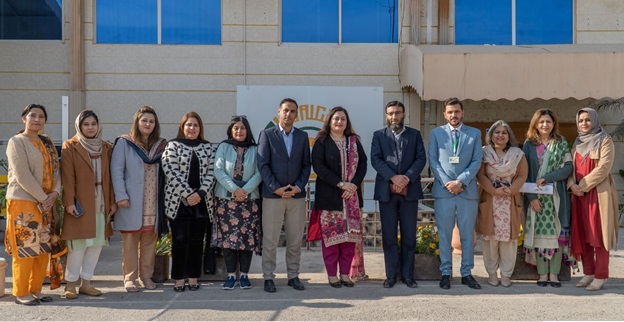
Tuberculosis Diagnosis is the evolving landscape of addressing the complexities posed by drug-resistant strains and co-infections which highlights the limitations of traditional methods and underscores the pressing need for innovative approaches to enhance speed and accuracy. Therefore, the role of interdisciplinary research and collaboration presents a range of cutting-edge solutions, including molecular tests, advanced imaging, AI algorithms, and point-of-care devices. The aim is to guide researchers, practitioners, and policymakers to synergize themselves in redefining TB diagnosis for improved global health outcomes. To discuss the aforesaid issues and challenges related to TB diagnosis NUMS Office of Research Innovation and Commercialization (ORIC) organized a capacity building session on the topic, "Tuberculosis Diagnosis: Emerging Challenges and Innovative Solutions" Held on Tuesday 08th, August 2023, at National University of Medical Sciences (PWD Campus, Islamabad). The session featured a distinguished keynote speaker; Dr. Nasim Akhter. She holds several significant positions including Head of Infection Prevention and Control Unit at PIMS, Islamabad, Deputy Director (Medical), and Clinical Head of Isolation Hospital and Infections Treatment Center (IHITC), Chak Shahzad, Islamabad under the Ministry of Health Services, Regulations & Coordination (MoHSR&C). Assistant Director (ORIC) opened the session with the welcome note & introduction of the respected guest speaker to the audience. The session was actively attended by faculty members and students from Biological Sciences.
Session Highlights:
The session began with an overview of tuberculosis and its global impact, emphasizing the need for accurate diagnosis. Challenges such as drug-resistant strains and limitations of current methods were discussed, along with difficulties in diagnosing extra pulmonary TB and co-infections like HIV. Socio-economic barriers to diagnosis were noted, especially in resource-limited settings. The importance of point-of-care diagnostics was highlighted for their potential in remote areas. Interdisciplinary collaboration was stressed, encouraging research to improve diagnostics. The session concluded by focusing on integrating innovative diagnostic solutions into TB control programs through advocacy.
Outcomes of the Session:
1) Research Collaboration: Encouraged collaboration among medical professionals, researchers, and technology experts, fostering cross-disciplinary research efforts to enhance TB diagnostics.
2) Innovative Ideas: Generated new research ideas, particularly in point-of-care diagnostics, stimulating the development of cost-effective and accessible TB tests for remote areas.
3) Bridging the Gap between Clinicians and Academia: Facilitated closer collaboration between researchers and medical consultants, allowing researchers to gain practical insights and medical consultants to stay informed about cutting-edge diagnostic methods.
4) Advocacy and Policy Influence: Motivated participants to advocate for the integration of emerging diagnostic solutions into national and international TB control programs, promoting policy changes that could improve public health outcomes.
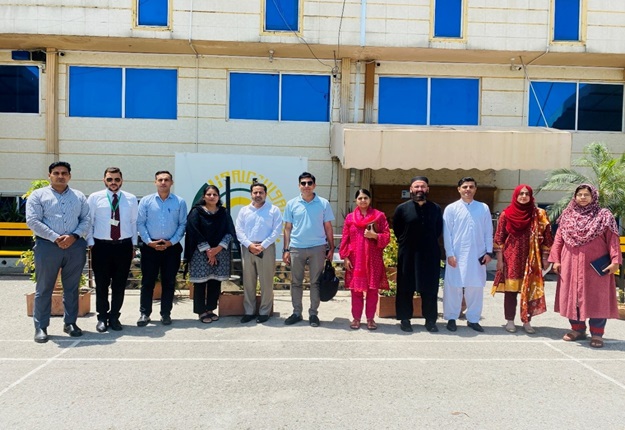
"Tools and Techniques for Population-based Nutritional Screening & Assessment" is a seminar designed to equip students with the knowledge and skills needed to identify and address nutritional deficiencies at a population level. The seminar delivers attendees with practical insights into the latest screening and assessment tools used in nutritional evaluation, as well as the techniques required for effective intervention and management of malnutrition. In this framework, NUMS-Office of research & Commercialization (ORIC) in collaboration with NUMS-Dept of Nutrition and Dietetics has organized a one-day capacity-building seminar titled "Tools and Techniques for Population-based Nutritional Screening & Assessment" at National University of Medical Sciences, PWD Campus, Islamabad on Wednesday, 5th April 2023. The highlight of the seminar was the guest speaker Dr. Zahra Ladhani who is a renowned healthcare expert. She has extensive experience in the healthcare industry as a healthcare consultant, having worked with different organizations across the world. The session was actively attended by faculty members and students from the NUMS Faculty of Department of Public Health and department of Nutrition and Dietetics. Honorable Dean of Multidisciplinary studies, Prof Dr. Aiysha Mohyuddin chaired the session. Dr. Abul Momin opened the session followed by the welcome note & introduction of the respected guest speaker to the audience by the Assistant Director ORIC. Throughout the presentation engaged attendees with interactive activities and encouraged questions and discussions. Attendees found the presentation to be highly informative and inspiring, with many expressing interest in pursuing further learning and development in healthcare. Attending this seminar had several benefits for students. Firstly, the seminar provided an opportunity for students to learn from experts in their fields and gain insights into the latest trends and developments in academia. Secondly, students had an opportunity to engage in discussions and debates with their peers, which helped them to develop their critical thinking and communication skills. Finally, the seminar provided an opportunity for students to network with other professionals and exchange ideas, which could lead to future collaborations and opportunities for professional development. Overall, attending this seminar was a valuable experience for all students to encourage them to apply the knowledge and skills gained from the seminar to their academic work and continue to seek opportunities for professional development.
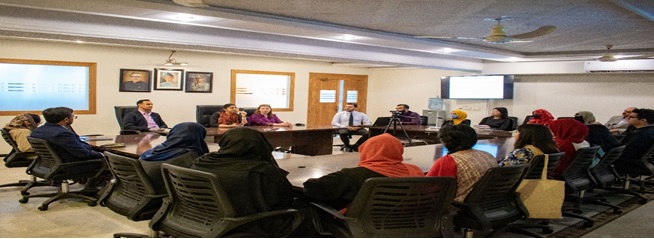
The Section of Phytochemistry and Natural Products Research, Department of Biological Sciences, NUMS in collaboration with National Council for Tibb, Islamabad, organized a workshop on the integration of Tibb Unani into modern medicine. The hybrid workshop was well attended on site as well as online. The workshop aimed to discuss the possible avenues for integration of Tibb Unani with modern medicine, forging a collaborative and holistic approach that would harnesses the strengths of both systems. Through a platform of dialogue, education, and idea exchange, participants engaged in expert presentations, interactive Q&A sessions, and a final roundtable discussion on future prospects. The following invited speakers shared their expertise on various engaging topics.
1. Hakeem Abdul Aziz
2. Colonel Hakeem Khalid Mehmood (R)
3. Hakeem Abdul Raees Khan
4. Ms. Sania Raees
5. Dr. Sayed Afzal Shah
6. Dr. Aman Karim
President Tibb Council for Pakistan, Hakeem Muhammad Ahmad Saleemi graced the occasion as Chief Guest and Mr. Hamza Sarosh, Senior Vice President Rawalpindi Chambers of Commerce and Hakeem/Dr. Abdul Wahid Shamsi (Chairman Inspection Committee, National Council for Tibb, Islamabad) were Guests of Honor at the event. The Pro Vice Chancellor, Maj Gen Syed Ammar Reza Hamdani, HI(M)(Retd) also briefly attended and exchanged ideas with the guests and participants.
Dr. Joham Sarfaraz Ali, welcomed the guests and briefed the participants about the various activities of the workshop while the Chief Organizer, Dr. Sayed Afzal Shah, discussed the aims and objectives of organizing the workshop as follows.
1. Enhance understanding and knowledge exchange.
2. Identify challenges and future prospects for research.
3. Conduct research to promote holistic healthcare and well-being.
Prof. Aisha Mohyuddin, in her opening remarks, welcomed the guests and emphasized on adopting evidence-based measures for integration of two healthcare approaches through collaboration and Research, so that the dream of holistic healthcare may be achieved.
The Chief Guest, while addressing the participants, appreciated the initiative taken by NUMS and promised full support for promoting research and education to integrate Tibb with conventional medicine. The Guest of Honor, Mr. Hamza Sarosh while giving his remarks felicitated the organizers for taking a step and assured the support of the RCCI for the endeavors to modernize Tibb.
Prof. Dilshad Ahmad Khan, presented NUMS Souvenir to the Chief Guest and highlighted the importance of Tibb Unani in his remarks.
The workshop’s speakers highlighted several key points for the integration of Tibb Unani and modern medicine. These include the need for scientific validation, improved presentation of data by hakeems, holistic care in modern medicine, addressing misconceptions around traditional medicine, the importance of diet, plant identification and nomenclature, integrating Tibb in tertiary healthcare, incentivizing research, and shifting research focus towards holistic aspects and synergistic effects. Emphasizing these points can drive progress in the integration and understanding of Tibb Unani with modern medicine.
The final hour Q&A Session was moderated by Dr. Aman Karim, where participants identified areas to work further through this platform which included; strengthening of government regulation on Tibb Education and Products used, strengthening of self-regulation among Tibb practitioners, formalizing Tibb education, promoting research on modernization of Tibb, and more inclusive networking.
Overall, the workshop was a great opportunity for participants to exchange knowledge and enhance their understanding of both Tibb Unani and modern medicine. The workshop was hosted by NUMS Office of Research, Innovation and Collaboration (ORIC) and Meezaan Dawakhana, Westridge 1, Rawalpindi.
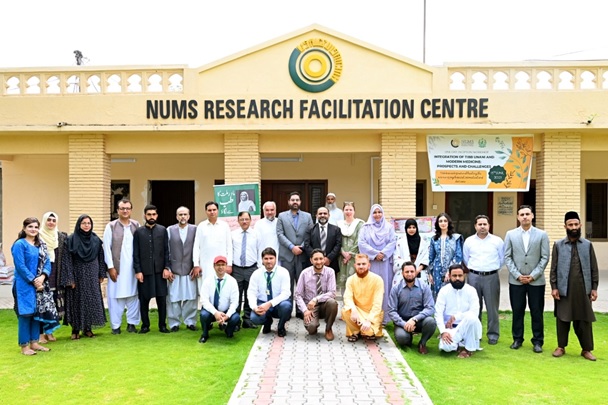
The "International Day of Mental Wellbeing" is an annual event that underscores the growing significance of mental health in our rapidly evolving world. The Office of Research, Innovation & Commercialisation (ORIC) at the National University of Medical Sciences (NUMS) organized a capacity building session on this topic on 12th October 2023. The session aimed to address the challenges and issues related to mental wellbeing and featured Dr. Mushayyada Nisar, a renowned Consultant Psychiatrist, as the keynote speaker.
The event began with the Assistant Director of ORIC welcoming the attendees and introducing Dr. Nisar. The audience comprised students and faculty from various departments, including Clinical Psychology, Biological Sciences, Public Health, and Psychology.
Key highlights from the session include:
Lifespan Approach: The session emphasized the need to address mental health issues across all life stages, from adolescence to adulthood and beyond. It highlighted early intervention for conditions like anxiety, depression, and peer pressure among adolescents.
Work-Life Balance: The challenges adults face in balancing work, family, and personal life were discussed, with a focus on effective stress management and recognition of burnout.
Elderly Mental Health: The often-overlooked mental health concerns of the elderly, such as loneliness and isolation, were highlighted. The role of social connections in their psychological well-being was stressed.
Evidence-Based Solutions: Evidence-based solutions were presented, promoting open communication and emotional support within families, encouraging adolescents to express their feelings, and fostering a non-judgmental environment.
Stress Reduction: The session discussed the importance of work-life balance, time management, and stress reduction techniques to address burnout, along with timely diagnosis and treatment of depression.
Self-Care: The importance of self-care practices, including exercise and a balanced diet, for maintaining mental well-being was emphasized.
Reducing Stigma: The need to reduce the stigma around mental health through open conversations in both personal and professional settings was advocated.
In conclusion, the Director of ORIC thanked Dr. Nisar for her expertise in psychiatric research and expressed gratitude to the attentive audience for their active participation in the session. This capacity building session served as a significant platform to address the vital aspects of mental well-being and the challenges individuals and communities face in maintaining their psychological health in the modern world.
